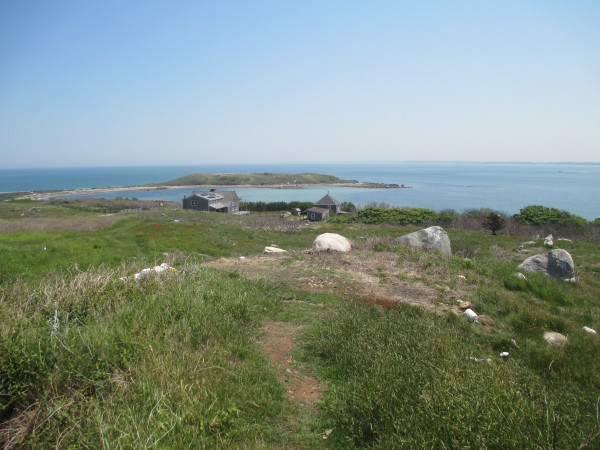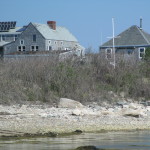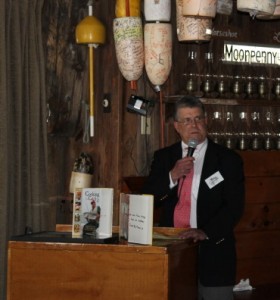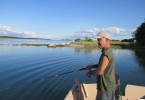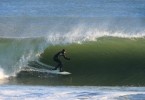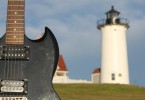PENIKESE ISLAND – This 75-acre island, a former leper colony that served as a school for troubled boys for 38 years before closing due to funding problems in 2011, is reopening this summer with a new mission: to help boys with substance abuse issues and emotional disorders. (See story on the island’s fascinating history.)
The transition to a new program is a necessary economic evolution from what it had been, said Jay Wolter, CEO of the Orford, New Hampshire-based non-profit, Becket Family of Services. Becket this spring joined with the Penikese Island School Board in a partnership to reopen the former Penikese Island School under the new name, Penikese.
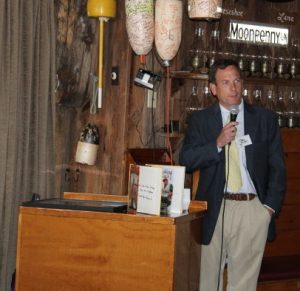
Jay Wolter of Becket Family of Services at a fundraiser for Penikese in May at the Landfall Restaurant in Woods Hole
“The reshaped Penikese may appeal to some of you but not to others,” Wolter told a crowd at a fundraiser at the Landfall Restaurant in Woods Hole in May. “But we are preserving many of the traditions of the island.”
Penikese is scheduled to open between July 15 and August 15, said Toby Lineaweaver, director of operations for Penikese. Lineaweaver is the former Executive Director of the Penikese Island School.
The Becket Family of Services, according to Wolter, is “a group of affiliated programs and schools that serve struggling adolescents and young adults in need of support.” Becket has 25 facilities in northern New England, and a few smaller programs in Massachusetts, said Wolter.
The new Penikese program, under the guidance of Becket, will be a sister program to the Mountain Valley Treatment Center, an existing Becket program for teens with anxiety disorders, in Pike, New Hampshire. The new Penikese program will be for teens with anxiety disorders, depression, and substance abuse issues, said Wolter.
A big reason for the transition is money, specifically insurance money. The school had to close two years ago due to lack of money. For years, the school had treated troubled boys, often steered by a Massachusetts judge to Penikese as an alternative choice – for a boy in trouble – to jail. This was paid for by the state.
But state policy began to change as to who was eligible to go to Penikese, and state funding dried up, said Lineaweaver. In February 2011, the school suspended operations.
The Penikese Board cut staff to zero, but continued to fundraise and began looking for a partner. Wolter, who once had a former Penikese employee work for him at Becket, was familiar with Penikese. “I had known about their struggles for quite some time,” he said.
The matchmaker for Penikese and Becket was Will White, a program consultant to the Family Support Collaborative, which is part of the Becket Family of Services. White, known as an expert in experiential education, was giving a talk on wilderness therapy when he was approached by a board member of Penikese asking if White knew anyone who would be interested in getting Penikese back up and running.
“I recognized that Becket Family Services might be the perfect match,” said White. “I did the introductions.”
Wolter said when he was approached by White, he immediately recognized the similarities between Penikese and Becket Family Services, which was started in 1964 by Wolter’s father. “My Dad was a former Marine, just like George Cadwalader,” said Wolter. Cadwalader was the founder of the Penikese Island School in 1973.
In November 2012, Wolter went to Penikese Island with Penikese Board Chairman Jim Newman. In May at the fundraiser, the partnership was announced.
The partnership between the two organizations, said Lineaweaver, is new and evolving. “Becket is putting up startup cash, administrative support and expertise,” he said. “We’re putting up the island facilities, onshore facilities, our vessel, our expertise and experience in running an island program, our relationship with the community and our supporters, and our brand.”
The new Penikese will not rely on state funding. “One of the beauties of being a not-for-profit is that we will be able to offer financial assistance,” said Carl Lovejoy, Director of External Affairs of the Mountain Valley Treatment Center, the sister program to Penikese. “So we will make sure at Penikese, like we do in all our private pay Becket programs, that we are able to offer the Penikese program to a socio-economically diverse group.”
The program will continue to do fundraising and offer financial aid, said Lovejoy, “to make sure it isn’t a program solely for the benefit of wealthy families.”
The typical stay will be 60 to 120 days, at a cost of $760 a day, said Lovejoy. This equals $45,600 for 60 days, and $91,200 for a 120-day stay. There will be various models of payment. Some families will pay all the cost themselves. Some will be helped by insurance. Some will be helped by insurance and financial aid, he said.
“Penikese is going to be incredibly well staffed. Not just well staffed, but talently staffed,” said Lovejoy. “In order to do that, we have to have a pretty hefty budget. People cost money.”
There will be 10 students on the island, and eight staff members will be on the island at all times, said White. Staff will include three residential staff, two therapists and a family therapist, said White. There is a rotation of staff members, who stay on the island for five days in a row, to ensure the island is always fully staffed.
The annual budget for the first year, said Wolter, will be approximately $1 million. The school has had $75,000 in recent upgrades, including a new roof and improvements to the 1800s water system, said Wolter.
The daily experience for young men on the island is going to include therapy to treat anxiety and depression disorders, a 12-step program to address substance abuse issues, and “we will recognize the fact that we are on an island and this is going to be a unique experience,” said Lovejoy.
Lineaweaver understands the healing essence of the island but said working with kids who have begun a path of substance abuse represents “a different set of challenges. “We’re trying to reach them before they hit bottom, before they’ve been arrested, before they’ve been incarcerated, before they blow up their college placements. We want to get kids before all that happens.”
The unique setting of the island can be beneficial to many kinds of kids, said Wolter. “In particular, kids who need to be kept away from substances. They need to stop using and get healthy again. Abstinence is starting point. But there is certain spirituality to that island that makes it a very good place for kids dealing with substance abuse issues.”
“The holistic environment of that island is an excellent platform to take a kid who has been struggling with substance abuse issues, and with anxiety, and to help them become reengaged in a self-sufficient setting,” said Wolter. “We will begin the process of re-exposing them to the world in a very simple way because the island is a very simple place.”
Brian Tarcy

